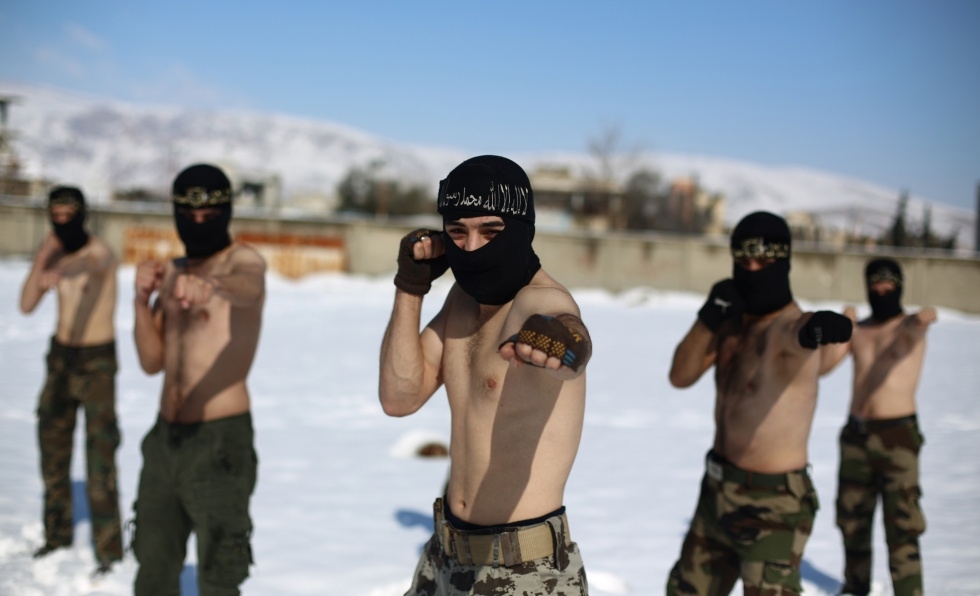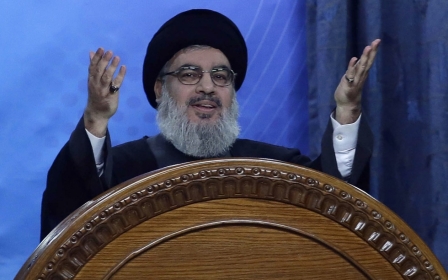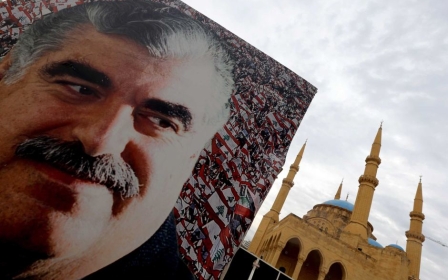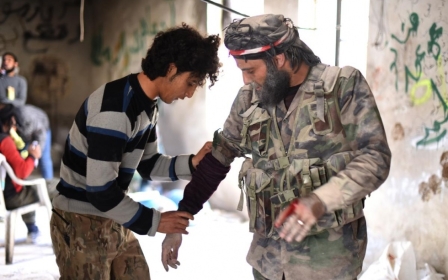Rise of Jaish al-Islam marks a turn in Syria conflict

The seizure of large swathes of Syria's Idlib province by opposition fighters has signalled for many a change in the balance of power in Syria's seemingly unending civil war.
While previously many had been predicting that Syrian President Bashar al-Assad was on the verge of reasserting his authority over the country, the loss of the cities of Idlib and Jisr al-Shughur and the continuing consolidation of opposition control throughout the province have led to suggestions that Assad is being put on the backfoot.
Jaish al-Islam (JAI) has been one of the major groups involved in operations in Idlib, making up part of the Battle of Victory operations room that took the city of Jisr al-Shughur in later April, a group which also includes the al-Qaeda affiliate Al-Nusra Front.
Abdurrahman Saleh, head of JAI's international media office, was one of the group's early devotees.
“I am from Aleppo – I was a member of a rebel group fighting the regime and we joined Jaish al-Islam to organise our work against the regime, to get what we want,” he told Middle East Eye.
“But our work with Jaish al-Islam does not mean we are seperated from Syrian society. We are part of the Syrian revolutionaries, we fight under the banner of Jaish al-Islam as a revolutionary Syrian group. Not for anything else.”
JAI formed after a merger involving around 60 groups, including Liwa al-Islam, and is itself one of the main components of the Islamic Front – a group of Gulf-backed fighting groups – and are thought to be second only to Ahrar al-Sham in terms of power and numbers.
The Islamic Front issued a charter in 2013 (prior to Jaish al-Islam's joining) that laid its principles for the creation of an Islamic-rooted society in which Islam would be the “religion of the state, and it is the principal and only source of legislation.”
However, Islamic Front have been careful to position itself within a nationalist framework, rejecting the “near enemy/far enemy” internationalism of al-Qaeda and the state-building project of the Islamic State (IS).
For their part, JAI are thought by analysts to command as many as 60 battalions, with around 20,000 fighters – entirely made up of Syrians, according to Saleh, rather than foreign volunteer fighters.
Its primary base of operations has been Damascus, particularly the Douma and East Ghouta regions - as a result JAI has been the subject of intense bombardment from the Syrian government, with hundreds killed in February.
Its military prowess was displayed in full glory last week with a video released showing graduates from JAI's military acadamy accompanying parades of soldiers, armoured vehicles and rockets.
“O mujihideen brothers! We will leave these fields in which we finished our course and preparation and we will continue with preparing to wage jihad,” says the group's leader, Zahran Alloush, speaking to the recruits from a podium.
“Today the world is conspiring against us. And we have no one but Allah, an excellent protector and helper is he!”
Hassan Hassan, Syrian-born author of ISIS: Inside the Army of Terror, has referred to the formation of the Islamic Front and Jaish al-Islam as an opportunity for the Syrian opposition to distance itself from Al Qaeda-type organisations.
“The Islamic Front and like-minded Salafi groups should be seen as an opportunity to counter Al Qaeda rather than a threat to Syria’s future,” he wrote in the National. “Additionally, it is worth mentioning that rank-and-file fighters are not completely in sync with their leaders in terms of ideology, including members of Jabhat Al Nusra.”
“The secular-leaning Free Syrian Army has failed miserably as a counterweight to radicals as it could not establish itself as an efficient force against the regime while it was seen as a puppet for outsiders.”
“The situation has deteriorated since then, and the second best thing is to support the latest powerful alliance,” he added. “The alternative is simply to drive these giants towards Al Qaeda.”
'We want an Islamic state'
Zahran Alloush, the group's charismatic leader, is son of the Damascus-based Salafist preacher Sheikh Abdullah Alloush. A religious hardliner, born in the town of Douma northeast of Damascus, he established himself as a leading figure in the Syrian opposition as leader of Liwa al-Islam, famous for a bombing in Damascus in 2012 that killed Syria's deputy defence minister Asef Shawkat and assistant vice president Hassan Turkman.
“He's gone on Lebanese TV and said that he's not for democracy and doesn't hope to create a democracy,” said Joshua Landis, associate professor in the School of International and Area Studies at the University of Oklahoma, and editor of Syria Comment. “He sees democracy as a European import that's a means to hoodwink the people of Syria and that Islam and Sharia law is a better system.”
“And when asked how he's going to create this state, he's very good at skirting the issue.”
Alloush has also been criticised in past for using sectarian language, particularly with regards to Alawites and Shiites.
In a video released online in 2013 called “Speech of the Mujahid Zahran Alloush to the Umma on the challange of the Rafida” (rafida refers to “rejectionists” and is generally taken in this context to refer to Shiites) he talks of the need to wash away the “filth” from Syria (which he refers to as Sham).
“The mujahediin of Sham will wash the filth of the Rafida and Rafidism from Sham, they will wash it forever, if Allah wills it, until they cleanse Bilad al-Sham from the filth of the Majous who have fought the religion of Allah,” he said in the video.
But Saleh was keen to deny any racist or sectarian intention on the part of JAI, emphasising a desire to see a pluralistic Syria.
“We don't mean that all Syrian society must be from one religion or one type of people, this is impossible,” he told MEE.
“For thousands of years all of these groups of people living in Syria and the Middle East in general, they have co-existed peacefully so we don't want to change the demographic or social or religious formula of this society.”
However, he accepted that the creation of an Islamic state was the group's ultimate goal.
“We want an Islamic state – but we do not force it,” he said. “We dream of an Islamic state, not like that of the IS state. We are not like IS, we don't think IS has anything to do with Islam.”
“If you want an Islamic state, you should not take the IS idea of the Islamic state and think we want the same – we dream of an Islamic state in the future, but this is not necessarily to be achieved the second day after the fall of Bashar al-Assad.”
He added that IS - which the group has been in conflict with repeatedly since 2013 - were "enemy number one of the Syrian revolution".
'Backed by Riyadh'
The Islamic Front is commonly thought to have been formed with the backing of Saudi Arabia, though the nature of their input has been shady.
Abdurrahman Saleh told MEE that JAI relied primarily on weapons taken from government forces.
“They [Arab governments] don't give us weapons – the main presence of JAI is in Ghouta and this area is besieged by regime forces," he said. "No country can provide us with weapons there, so we depend mainly on what we get from the regime during the fight.”
“If it comes [outside support] mainly it comes from Syrians living abroad, whether in Saudi Arabia or other countries.”
He acknowledged, however, that some foreign governments provided support to "operation rooms" involving JAI, but they did not support "specific groups”.
In April, Alloush – previously described by Hassan as “backed by Riyadh” - travelled to Istanbul with the intention of holding “meetings with rebels and other personalities” with a goal to “lift the siege on civilians in the Ghouta and southern Damascus”, according to JAI spokesperson Islam Alloush.
Photos captured in Istanbul showing Alloush meeting with Ahmed Eissa Al-Sheikh, leader of Suquor al-Sham (now merged into Ahrar al-Sham) and Hashem Al-Sheikh (better known as Abu Jaber) leader of Ahrar al-Sham:
However, sources told Al-Araby Al-Jadeed that the visit had been connected to a visit to Saudi Arabia by Khaled Khoja, one of the leaders of the opposition Syrian National Council, with a view to creating intermediaries between Alloush and the kingdom.
The ascension to throne by King Salman in Saudi Arabia following the death of Abdullah has seemingly created the impetus for a new, more efficient coordination between the benefactors of the Syrian rebels.
The refocus on Iran and Syria by Salman – rather than targeting the Muslim Brotherhood – has reportedly allowed the kingdom, along with Turkey and Qatar, to focus their distribution of resources and expertise on those sections of the opposition not affiliated with IS and has been cited as a major factor behind the rapid takeover of Idlib province.
In addition, JAI are not, at least on the surface, the kind of group that the US would be happy to back publicly, not least because of their willingness to work with Al-Nusra Front. But the collapse of Harakat Hazm, a group the US was training and funding, in early 2015, has led to a breakdown of any serious strategy by the US with regards to propping up the anti-Assad rebels.
“America doesn't have a strategy,” said Landis. “They said their strategy was train and equip, but they're not doing it and nobody believes that's a viable strategy. So really, I think that Turkey, Saudi Arabia and Qatar have come to the conclusion that if they want to get rid of Assad, they're going to have do it on their own and they're going to have to fire up these Islamists.”
New MEE newsletter: Jerusalem Dispatch
Sign up to get the latest insights and analysis on Israel-Palestine, alongside Turkey Unpacked and other MEE newsletters
Middle East Eye delivers independent and unrivalled coverage and analysis of the Middle East, North Africa and beyond. To learn more about republishing this content and the associated fees, please fill out this form. More about MEE can be found here.




